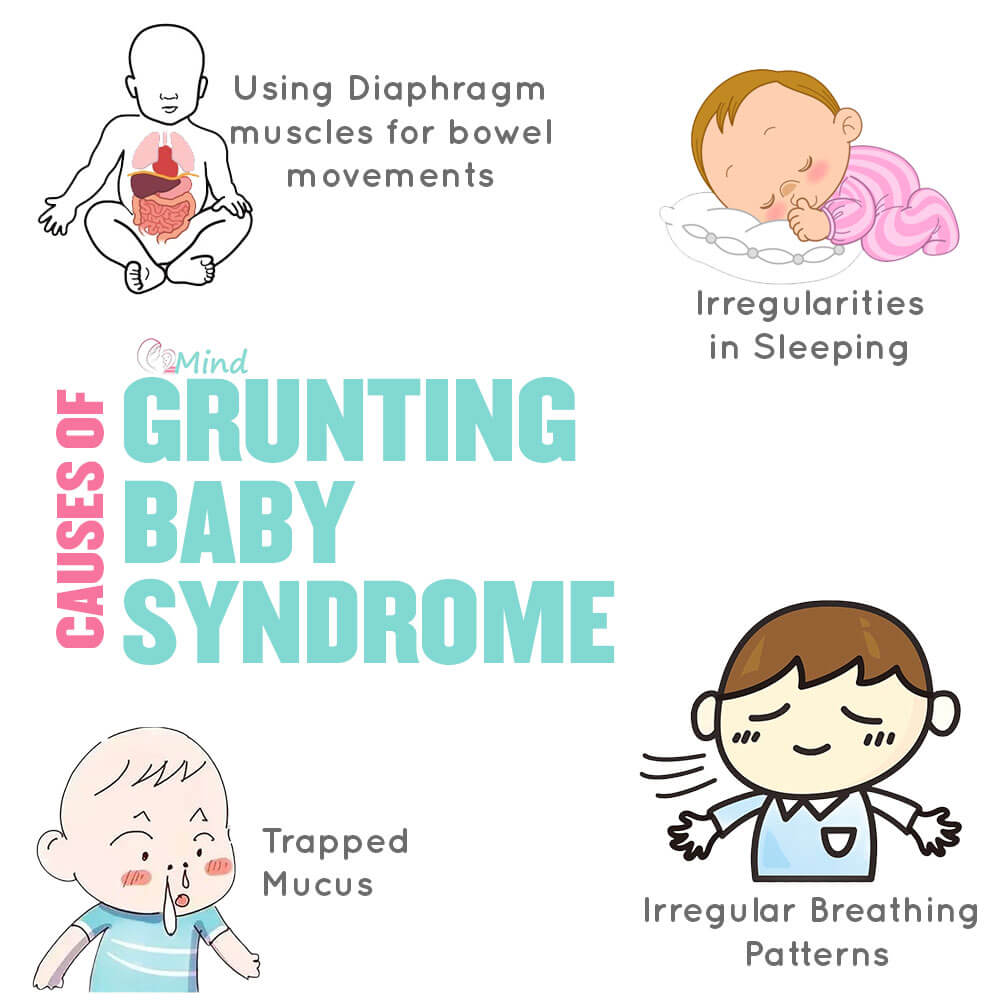Grunting Baby Syndrome – Why is your Baby Grunting?

For a parent of a newborn, things can get a little overwhelming at times. And these parents can be as sensitive as their infants are. Looking at your baby even in the slightest pain can be extremely agonizing. One of the common kinds of pain that a baby suffers from is grunting. A baby may grunt while playing, pooping and even sleeping.
Grunting can be caused due to many reasons but one of the dominant reasons can be the grunting baby syndrome. Even though it is not rare, the grunting baby syndrome still remains a mystery to most new parents. And to add to this confusion is its similarities with constipation. Your baby surely looks uncomfortable while pooping which is when they have grunting baby syndrome, it is because they have to work hard to figure out how to poop.
But the good news is that this discomfort for the baby, and thus for the parents, is short-lived and gets resolved as soon as the babies complete their bowel movement. If you are looking about this condition as a to-be parent or a parent or a caretaker of a newly born baby, you do not have to worry at all. We have got it all covered for you. Read on to learn all about the Grunting Baby Syndrome.
What is Grunting Baby Syndrome
At the first glance, the grunting baby syndrome may seem disguisedly similar to constipation but there is a clear difference between the two. However, if the stool in the baby’s diaper is soft, there are chances that those noises coming from your baby’s stomach are being caused by something else.
If your infant baby grunts, wriths, turns red or shows signs of strain while trying to poop, they might be having a condition named Infant Dyschezia. In a more general language, it is known as grunting baby syndrome (GBS). Quite obviously, seeing your baby turn red or seem to work hard to poop may seem something to be concerned about, it is in fact quite normal and most probably not a cause for concern.
Causes of Grunting Baby Syndrome
Now that you know what the baby grunting syndrome is, it is essential to know what causes your newborn to grunt as they are trying to get used to their bowel movements. In order to pass stool, an adult has to relax their pelvic floor and then use the stomach muscles for applying pressure that eventually helps in moving the stool through the intestines. But the case isn’t exactly the same for a newborn baby. Let us delve into the science of your baby’s body.
The world-famous paediatrician Dr Harvey Karp in his book, Happiest Baby on the Block, explains that it is difficult to poop as a baby. This is mostly because a baby has to do opposite things — tighten the muscles of the stomach while simultaneously relaxing the anus. It takes a baby’s body some practice to use their abdominal muscles for moving their poop and gas across their system while also relaxing the pelvic floor. While they are still figuring it out, it can cause pain as well as discomfort until your newborn learns the needed coordination.

At first, a newborn’s stomach muscles are not strong enough to do this, so the baby ends up using their diaphragm muscle for moving their bowel. It is during this exercise of the diaphragm that can exert pressure on the voice box, resulting ultimately in grunting.
However, this is not the only reason due to which your baby may be grunting. Moreover, some babies even grunt during their sleep. So the other things that may cause newborn grunting to include irregular breathing patterns, trapped mucus, and the gastroesophageal reflux (GER). Babies may grunt when they start to develop control over their breathing patterns or when mucus gets collected in their narrow nasal passages. Gastroesophageal reflux which is otherwise known as acid reflux is also one of the reasons. The food content from the baby’s stomach may rise into the baby’s food pipe causing the discomfort making the baby grunt. The baby grunting during sleeping may also be caused because they are dreaming.
Recommended: Best Anti Colic Bottles in UK
Symptoms of Grunting Baby Syndrome

Even though grunting baby syndrome is pretty common among the kids, catching the common symptoms can get difficult for parents of the newborn babies. This is intensified by the fact that it can be easily mistaken for constipation. So in order to check whether your baby does or does not have Grunting Baby Syndrome, check for the following symptoms in your baby when they are trying to poop.
You may want to start by looking for any kind of crying or screaming as your baby tries to have a bowel movement. This may include straining as well as turning red, or even dark purple due to the strain. Along with this, you may notice that your baby is squeezing their abdominal muscles.
In case your baby suffers from Grunting Baby Syndrome, they will experience most, or even all, of these symptoms for around five or ten minutes before they are finally able to pass stool and start feeling comfortable once again.
Grunting vs Constipation
Even when you now know the symptoms of Grunting Baby Syndrome, you may mistake it for constipation, or worse, vice versa. And this confusion is obvious since grunting can also be associated with constipation. But you don’t have to worry about that. We are here with a clear distinction between grunting and constipation for you.
When an infant has constipation, which is actually rare, the newborn passes hard or even pellet-like stool. The baby also experiences infrequent bowel movements. This is starkly different from the grunting baby syndrome. In grunting baby syndrome, the infant still poops regularly and has soft or semi solid poop. If you are afraid that your baby is constipated, we advise you to check with your doctor.
While suffering from constipation, your newly born baby may make grunting noises but not pass stool immediately after the grunting episode. The baby can go three to four days between two bowel movements and have hard, compact stools when they finally poop. Thankfully, GBS is easy to fix once detected. All you need to do is to ensure that the constipation is caused due to general reasons like dehydration or unsuitable baby feeding formula and not something concerning such as hypothyroidism or the Hirschsprung’s disease. In either case, it is suggested that a doctor is consulted with.
Remedies to Treat Grunting Baby

There is no particular medicine to help your baby recover from the grunting baby syndrome. And indeed, the best thing a parent could do whose baby has grunting baby syndrome is to wait for their baby to adjust to the bowel movement. Having said that, it is important to tell you that there are few remedies that some parents opt for treating the grunting baby.
The most common solution, which is chosen by many parents, is anal stimulation. Many doctors suggest this since it relieves the infants almost right away. For this anal stimulations, one may use an anal thermometer or cotton ball to move everything along. Even though this solution definitely provides immediate relief, it can cause a long-term side effect. Since grunting baby syndrome is related to the babies learning to relax their anus while pushing with their abdomen, stimulation isn’t recommended since it just delays this realization for the baby.
We understand the agony parents go through as they watch their baby squirm in pain from the ineffective and futile pressure exertion. However, it is important for them to realize that this is a part of their baby’s growth. Eventually, their baby will end up learning to push by their own abdominal muscles and produce bowel movements like the others.
In most cases, the newborns who suffer from the grunting baby syndrome get a hang of the abdominal muscle control required for pooping within a few weeks of birth. However, if you suspect that your baby suffers from the grunting baby syndrome, it is advisable that you do not attempt to treat the condition on your own.
When to see a doctor?
If you find your baby grunting which otherwise does not seem to have any connection to bowel movements, you could mention this to the baby’s paediatrician. It could be a sign of acid reflux which in technical terms is known as gastroesophageal reflux (GER). Even though we hope that nothing extreme has been happening to your baby along with the grunting but if your baby seems to have respiratory issues, such as wheezing, bluish or violet lips, and/ or fingernails accompanied with an increase in the breathing rate, you must contact your medical care provider immediately. This is of the utmost importance since these issues can very well be the signs of respiratory distress that are extremely serious, especially in infants. You may even want to visit a doctor if you detect the symptoms of grunting baby syndrome in your baby.
Conclusion
Grunting Baby Syndrome is, in its simplest form, your baby trying to adapt to the bowel movements and facing slight issues during the process. While the parents may be scared to look at their baby going through the pain, there isn’t a lot they can or should do. If your baby suffers from the grunting baby syndrome, we suggest you keep calm and have patience, there isn’t anything wrong with your baby most probably. It is just a matter of a few weeks before your baby learns the bowel movements perfectly. As last, we suggest all the readers keep a check for the symptoms for at least two days before coming to any conclusion regarding the syndrome. We also hope that we were able to help you gain some clarity over this issue!

Laura is a trained primary teacher who takes a profound liking in interacting with and bringing out the best in children. She is also an ISSA certified pediatrician with an extensive practice of over 12 years. Laura comprehends the needs of infants and now compresses her expertise into writing thorough parenting guides to aid new parents.





